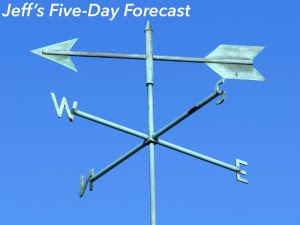“God says: It is too light a thing that you should be my servant to raise up the tribes of Jacob and to restore the survivors of Israel; I will give you as a light to the nations, that my salvation may reach to the end of the earth.”
-Isaiah 49:6
The light above our kitchen stovetop burned out a few weeks ago. Finally, I attended to it this past weekend.
But a curious thing happened when I replaced that lightbulb. I noticed other lights in our house that didn’t seem to be measuring up. The light in the upstairs hallway looked dim and dingy. The light above the kitchen table was pale and sickly. The light above our kitchen countertop was suddenly a deficient source of illumination.
Upon closer examination, I found that some of the lightbulbs in these disappointing lights had burned out. Some had older, less efficient bulbs. Other lightbulbs were the wrong wattage.
So, I replaced the light bulbs. I cleaned out the lights themselves (blasted ladybugs), and I marveled at the difference that the new light made. In fact, some of us in the Mathis household wondered if some of the light was too bright. The kitchen, now bathed in a more purifying light, showed the signs of cleaning deficiencies and needed home repairs.
Maybe a weaker light is the preferred light. It would certainly mean that we see things less clearly. That has its advantages, doesn’t it?
Light illuminates. Light reveals. Light convicts.
This month, we will be taking a new look at a familiar term in our ecclesiastical lexicon: missions. What does it mean to be on mission? A frequently used buzzword in church life is missional. What does that even mean?
Our scripture passage from this past Sunday reveals God’s intention for His people. And it’s bigger than his hearers had envisioned.
“It’s too small a thing,” God says, “to occupy yourselves with yourselves. I have greater plans for you than that.”
“You are to be a light to the nations—to the world and the people who do not yet know me. You are to be a light so that the gift of my salvation can be available to all.”
According to God’s word, we do not exist to be a blessing to ourselves. It’s too small a thing to be consumed with our own success. We are to be about more than just maintaining our own well-being. Rather, God intends for us to be light so that others can see.
Actually, let’s clarify that. We, ourselves, are not the light. Jesus points this out to us in his Sermon on the Mount. Those who belong to Christ, those who have decided to be Kingdom People, those who have professed Christ and who build their foundations on Jesus’s teachings, are the light because Christ shines through them. In short, I am not my own light. My own sense of enlightenment will not save me. My good ideas and good intentions will not save anyone or anything.
Christ Jesus is our light. And when Christ lives in our hearts and in our minds and in our souls, we are directed to let Christ’s light shine before others so that the world will see His light and give glory to God in heaven (Matthew 5:16).
The sooner we learn this, the more dependent upon Christ we will become. For us to be effective, we’ve got to invite Christ to shine through us. Christ’s values, words, and directions must shine through us. Otherwise, any light that extends from us will be weak and ineffective; it will mask corruption and hinder restorative action.
But God’s light purifies and directs. God’s light reveals and convicts. God’s light makes the Path clear and becomes a beacon for those who are lost along the way.
As Jesus illustrates in Matthew 5, God did not create us to be light for a corner of the house, or simply a portion of our community. God’s light shines through us to light the whole house and to be a blessing to the very ends of the earth.
We’ve sung it frequently at the end of our worship services, and it bears repeating here. It’s a fitting prayer, and a powerful charge:
“Shine, Jesus, shine, fill this land with the Father's glory,
Blaze, Spirit, blaze; set our hearts on fire,
Flow, river, flow; flood the nations with grace and mercy,
Send forth your word, Lord, and let there be light.”
That’s all well and fine. But we’ve first got to allow God to swap out the source of our light from ourselves to Christ. We do that when we “gaze on God’s kingly brightness so our faces display His likeness.”
Therefore, this verse must be prayed before we flip the switch:
“Lord, I come to your awesome presence,
From the shadows into your radiance,
By the blood I may enter your brightness,
Search me, try me, consume all my darkness,
Shine on me, shine on me.”
Yes, God. Shine on us. Shine through us. Not for our own sake. But for the world’s.











